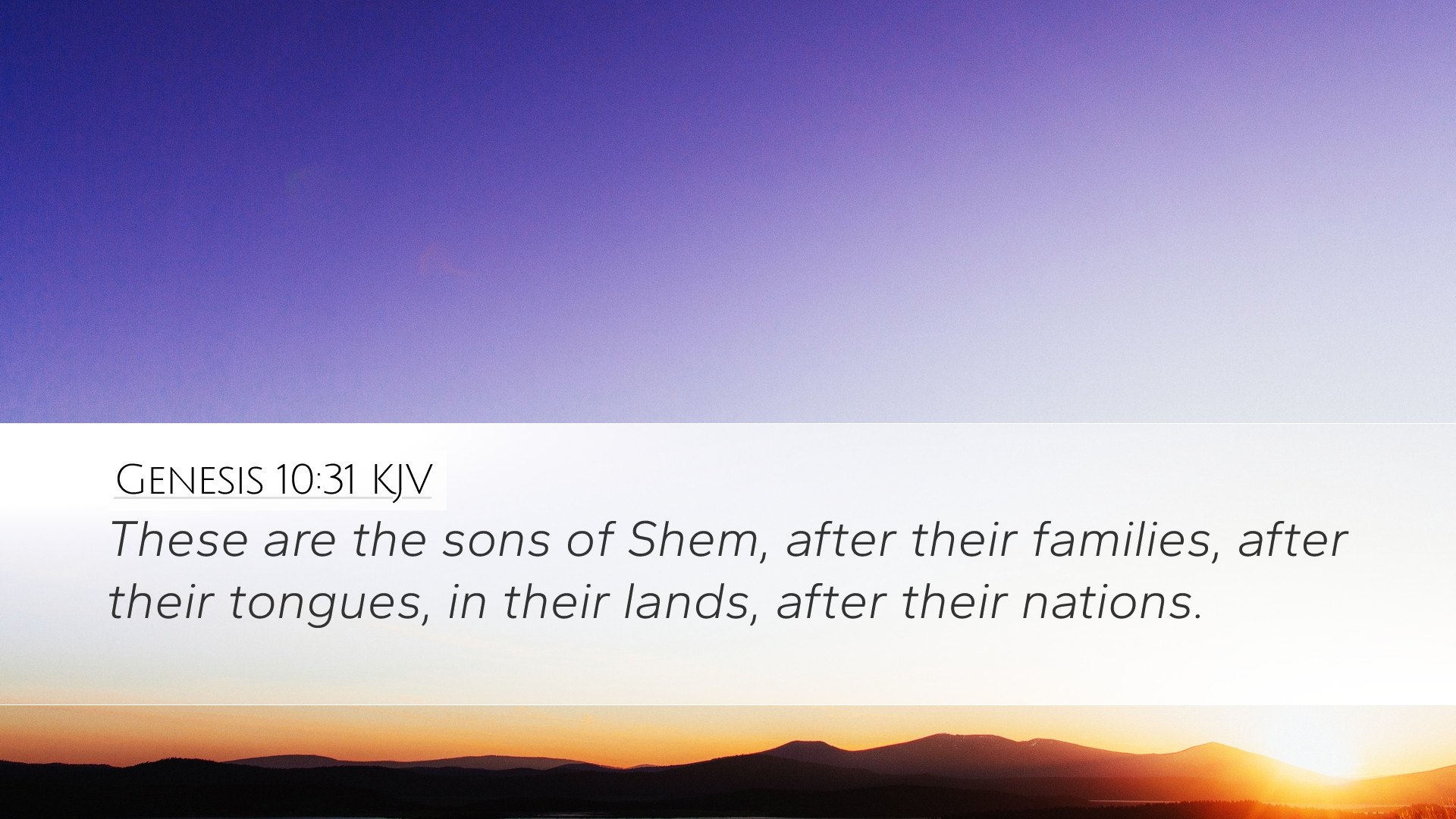Commentary on Genesis 10:31
Genesis 10:31 states: "These are the sons of Shem, after their families, after their tongues, in their lands, after their nations." In this verse, we find a pivotal connection to the genealogical records that underpin the history of mankind after the flood. This commentary synthesizes insights from various public domain sources, offering a comprehensive understanding for pastors, students, and scholars alike.
Contextual Overview
The passage falls within the genealogical framework of the Book of Genesis, particularly in the Table of Nations (Genesis 10). This chapter serves to map the lineage of Noah's sons—Shem, Ham, and Japheth—detailing the dispersion of nations post-flood. By starting with Shem, the chosen line from which Israel would eventually arise, the importance of this lineage is underscored.
Historical and Theological Significance
Matthew Henry notes that the genealogies in Genesis serve a dual purpose: they affirm God’s providence over human affairs and highlight the fulfillment of divine promises. This verse is significant as it demonstrates God’s faithfulness to Shem’s line, which leads to Abraham and ultimately to the Messiah.
- Divine Order: The orderly presentation of Shem's descendants illustrates God's providence in preserving a chosen lineage.
- Fulfillment of Promises: The mention of nations and families reveals the unfolding of God's plan to bless all nations through Shem’s lineage (Genesis 12:3).
Insights from Albert Barnes
Albert Barnes elucidates the broader implications of Shem's descendants, emphasizing the diversity of nations and languages that emerged from this lineage. He suggests that the identification of "tongues" points to the future division at Babel (Genesis 11), where the unity of humanity was disrupted.
- The Unity of Mankind: In the early chapters, all humans spoke a single tongue, reinforcing the collective identity.
- The Importance of Families: Barnes highlights the familial structures as foundational to both social order and divine promise.
Perspectives from Adam Clarke
Adam Clarke's commentary dives deeper into the patriarchal roots of Shem's descendants. He elaborates on how the heritage of Shem produced significant nations, with a clear focus on the contributions of these lineages to world history.
- Shem's Lineage: Clarke identifies significant characters such as Eber, from whom the term "Hebrew" is derived, pinpointing the lineage that leads to the Israelites.
- Role of Geography: The distribution of Shem’s descendants across various regions underscores the interaction between geography and cultural identity.
Theological Implications
This verse propounds profound theological implications regarding God's sovereignty over history. By chronologically presenting Shem's descendants, Genesis emphasizes how God's redemptive plan unfolds through specific individuals and nations. This challenges readers to reflect on their place within God's narrative.
- The Diversity of the Church: Just as Shem's descendants represent various nations and languages, the Church now encompasses a multitude of cultures, reflecting God's redemptive work across the globe.
- Covenantal Continuity: The continuity of God's covenant through Shem's line invites theological discussions about the nature of divine promises and their fulfillment through Jesus Christ.
Practical Lessons
For pastors and theologians, Genesis 10:31 serves as a reminder of the significance of heritage, identity, and the unfolding of God's plan. Here are some practical lessons derived from this text:
- The Importance of Heritage: Understanding one's spiritual heritage enriches one’s faith and can guide personal and communal identity in Christ.
- Unity in Diversity: Emphasizing the need for unity among diverse congregations mirrors the divine intention for the Church—a body with many parts, all playing a crucial role in God’s mission.
- Focus on Future Generations: Just as Shem's legacy shaped future nations, believers are urged to consider the legacy they leave for future generations.
Conclusion
In Genesis 10:31, the detailed genealogical account affirms the sovereignty of God in managing humanity's story post-flood. The mention of Shem's descendants reflects a crucial aspect of biblical theology—the foundational role of chosen families and nations in God's redemptive purpose. For students and scholars delving into Scripture, this passage not only provides a historical record but also invites reflection on the interplay of divine sovereignty and human history. As we engage with this text, may we be encouraged to see our place within God's unfolding narrative and honor the heritage of faith that connects us to the past, present, and future.


